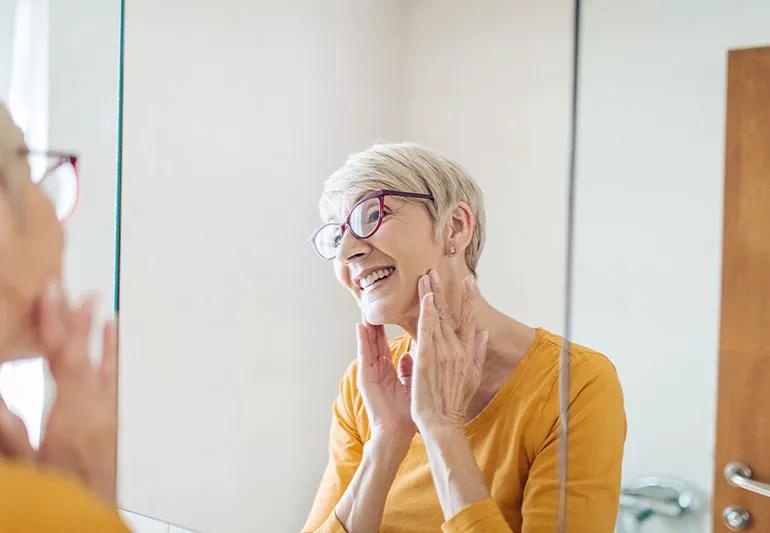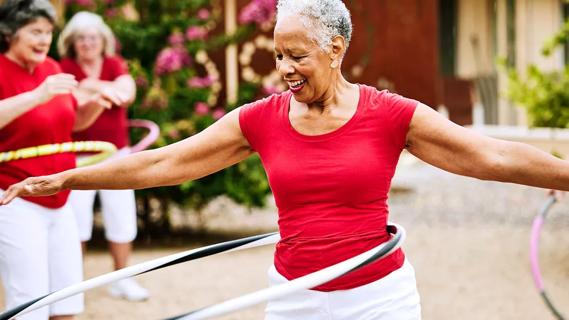Understanding what's in your control, and what's not

If life is about change, skin is proof. How your skin ages depends on such factors like your lifestyle, diet, heredity and personal habits, including your skin care routine.
Advertisement
Cleveland Clinic is a non-profit academic medical center. Advertising on our site helps support our mission. We do not endorse non-Cleveland Clinic products or services. Policy
To better understand the causes behind skin aging and what you can — and can’t — do to control it, we talked to dermatologist Alok Vij, MD.
“As we age, skin visibly changes in several ways,” says Dr. Vij, “and a lot of it has to do things beyond your control.”
As we age, he says, skin becomes:
But skin across your body isn’t the only place it changes. Aging skin can also change the appearance of your face. Don’t be alarmed, though, because it’s a natural part of aging.
Some factors include:
Advertisement
We’ve all heard how overexposure to sun can enhance aging in our skin, but how exactly does it happen? “Over time, the sun’s ultraviolet (UV) light damages certain fibers in the skin called elastin,” Dr. Vij notes.
He continues, “The breakdown of elastin fibers causes the skin to sag, stretch, and lose its ability to snap back after stretching.”
The skin also bruises and tears more easily and takes longer to heal. So while sun damage may not show when you’re young, it will later in life.
Nothing can completely undo sun damage, although the skin can sometimes repair itself. “It’s never too late to begin protecting yourself from the sun,” Dr. Vij says. “You can delay changes associated with aging by staying out of the sun. When you do go out, using a sunscreen with SPF 30 or higher can protect your skin.”
In addition, reapplying sunscreen every two hours or sooner if you get wet or sweat heavily will make an even bigger difference.
There are plenty of other reasons your skin ages as you get older.
Gravity. When the skin loses its elasticity, gravity causes drooping of the eyebrows and eyelids; looseness and fullness under the cheeks and jaw (jowls and “double chin”); and a lengthening of the ear lobes.
Obesity. “Excess weight causes skin to stretch and decreases the strength and luster of the hair and nails,” says Dr. Vij. It also causes skin conditions including dark patches on the skin (acanthosis nigricans), growths that stick out from the skin (skin tags), stretch marks, and varicose veins.
Obesity has been linked to other skin conditions, including psoriasis and cellulitis. “Although patches of psoriasis (itchy, dry, red patches) can occur anywhere in the body, they frequently develop on the scalp or near the hairline,” he adds. Folds of excess body skin can rub against each other and cause skin irritation, blisters, chafing, skin rashes, and skin infections.
Daily facial movements. Yes, laugh lines are (sort of) real. “Lines on the face become more visible after the skin starts losing its elasticity, usually as people reach their 30s and 40s,” Dr. Vij points out. Lines may appear horizontally on the forehead, vertically on the skin above the top of the nose (often called 11 lines), or as small curved lines on the temples, upper cheeks and around the mouth.
Sleeping position. How you sleep can play a role, too. Sleep creases are commonly seen on the side of the forehead, starting above the eyebrows to the hairline near the temples, as well as on the middle of the cheeks. “These result from the way the head is positioned on the pillow and may become more visible after the skin starts losing its elasticity,” Dr. Vij says. Changing your sleep positions may improve these sleep creases or prevent them from becoming worse.
Advertisement
Smoking. People who smoke tend to have more wrinkles than people who don't smoke. The reason for this difference is unclear. It may be because smoking interferes with normal blood flow in the skin.
Dry and itchy skin. Dry skin is common in later life. About 85% of older adults develop “winter itch” because overheated indoor air is dry. Dr. Vij adds, “The loss of sweat and oil glands as we age may also worsen dry skin. Anything that further dries the skin — such as overuse of soaps, antiperspirants, perfumes, or hot baths — will make the problem worse.”
Dry skin itches because it is irritated easily. If your skin is very dry and itchy, this condition can affect your sleep, cause irritability, it could be a symptom of a disease. For example, diabetes and kidney disease can cause itching. Some medicines make the itchiness worse. In that case, be sure to see your healthcare provider to see what the cause may be and any potential treatment possibilities.
Advertisement
Learn more about our editorial process.
Advertisement

Your cells and tissues may be aging faster or slower than your actual age

Biological changes, family issues and work problems may cause you to reevaluate your life and make changes for the better

Living longer is more than just growing older — it’s also about living life to its fullest

It's never too early to prevent bone loss with diet, physical activity

How to exercise as you age

Advice for preventing and treating health issues

Take steps now to keep them in good working order

Mental health issues can be tied to medical problems

Wearing a scarf, adjusting your outdoor activities and following your asthma treatment plan can help limit breathing problems

Your diet in the weeks, days and hours ahead of your race can power you to the finish line

When someone guilt trips you, they’re using emotionally manipulative behavior to try to get you to act a certain way